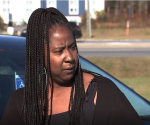White House hosts first-ever Maternal Health Day of Action to address maternal mortality crisis
[ad_1]
The White House led its first Maternal Health Day of Action on Tuesday, announcing a number of new commitments intended to improve pregnancy outcomes and reduce the risk of complications and death in the year following birth. The U.S., according to the administration, has the “highest maternal mortality rate of any wealthy nation in the world.”
The White House once again urged Congress to pass the President’s Build Back Better Act, which includes a $3 billion investment in maternal health. If passed, the act would require states to offer Medicaid-covered health services for up to a year post-partum. The House approved the Build Back Better plan in November, but the act is still being discussed in the Senate.
The time immediately following childbirth is “critical,” according to the Department of Health and Human Services. In a report published on Tuesday, the agency found that one in three pregnancy-related deaths occur between one week and one year after childbirth, making a continuity of health insurance vital during the time.
Rohini Kosoglu, a domestic policy adviser for Vice President Kamala Harris, told CBSN “Red & Blue” host Elaine Quijano on Tuesday that currently, states do not have to offer such services, which include check-ups, vaccinations and pelvic exams.
“What we need states to do around the country is to make sure that women have those services covered,” Kosoglu said. “And so what Build Back Better would do is require states to do those programs and give them the funding to do those programs.”
If every state extended its post-partum coverage to 12 months, the HHS report says, then the number of people in the U.S. getting coverage for a full year postpartum would “roughly double.”
Vice President Harris spoke at a summit on Tuesday, saying the “challenge” of maternal mortality “is urgent and important.”
“To put it simply, here’s how I feel about this: In the United States of America in the 21st century, being pregnant and giving birth should not carry such great risk,” she said. “But the truth is women in our nation — and this is a hard truth — women in our nation are dying. Before, during, and after childbirth, women in our nation are dying at a higher rate than any other developed nation in our world.”
In 2020, the Commonwealth Fund, a private foundation that supports independent research on health care issues, published a report finding that the U.S. has the “highest maternal mortality rate among developed countries.” The country’s “relative undersupply of maternity care providers, especially midwives” and lack of comprehensive post-partum support is what greatly contributes to the problem, they said, adding that the U.S. is the only country out of the 10 other high-income nations studied to not guarantee access to provider home visits or paid parental leave.
When speaking with CBSN, Kosoglu also highlighted the racial disparity among maternal health rates.
“Black women and Native American women are dying at a disproportional rate, and so we must do everything we can,” Kosoglu said. “As the vice president said today, this is a serious crisis that deserves immediate action.”
More than 750 people died of maternal causes in the U.S. in 2019, according to the Centers for Disease Control and Prevention. The maternal mortality rate, deaths per 100,000 live births, was 2.5 times higher for Black women than for White women during that time.
Tuesday’s HHS report had similar findings, saying that pregnancy-related death rates are two to three times higher among Black or Indigenous populations compared to White populations. Severe maternal morbidity, unexpected outcomes of labor and delivery that impact the pregnant person’s health, is 1.9 times higher among Black populations than White populations.
The report also found that 42% of births in the U.S. are paid for by Medicaid, and that most of the people benefiting from this specifically are Black, Latino or Indigenous who are under 19 years old and living in rural areas with lower levels of education.
The White House said the Centers for Medicare and Medicaid Services is planning to propose a “birthing-friendly” hospital designation, the first-ever hospital designation by HHS to specifically focus on maternity care. Hospitals that work to improve maternal outcomes and create patient safety practices would be eligible for the designation.
Several organizations and groups announced their own commitments to combat the crisis. Harris said that more than 20 companies and non-profits pledged to invest more than $20 million domestically and more than $150 million globally to combat the crisis.
“This is about the rights of women. This is about the future of our nation. And this will take all of us,” Harris said Tuesday. “On this Day of Action, may the women of our nation know: I hear you. We hear you.”
[ad_2]
Source link











